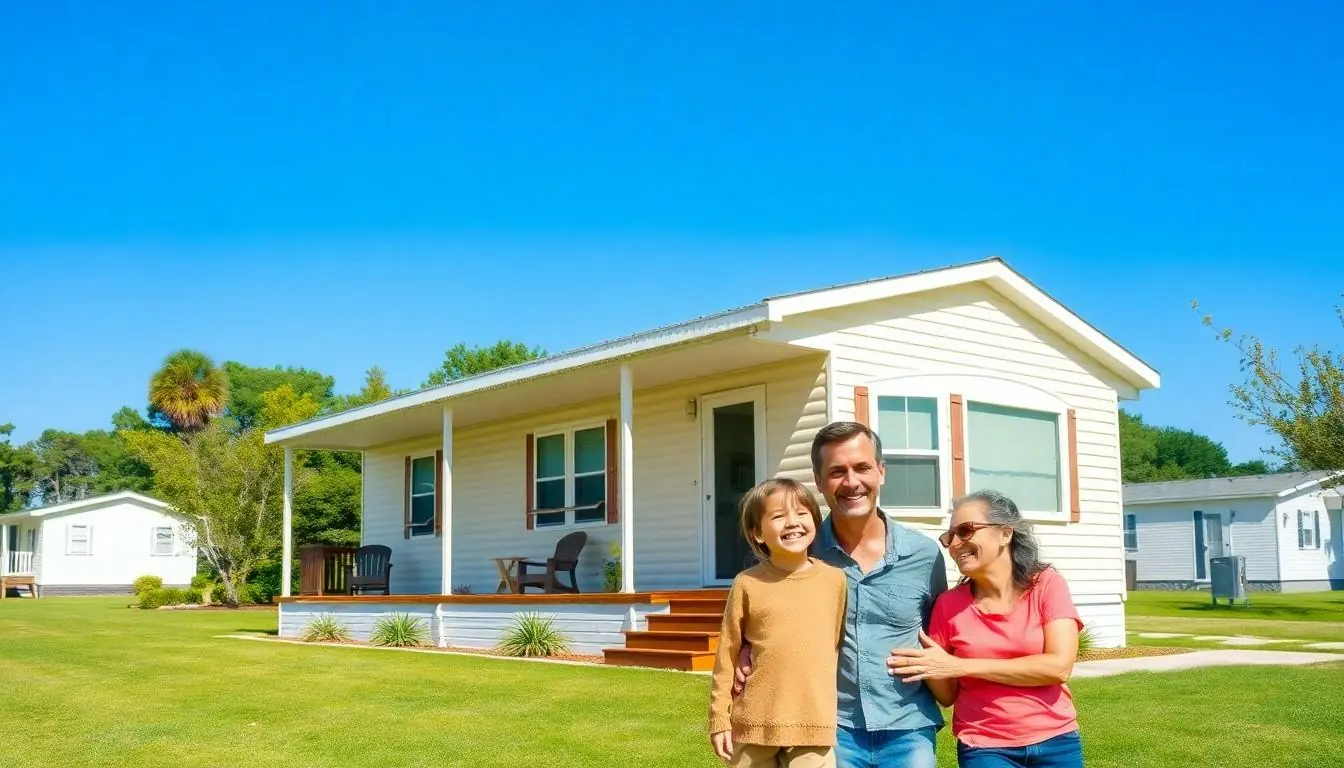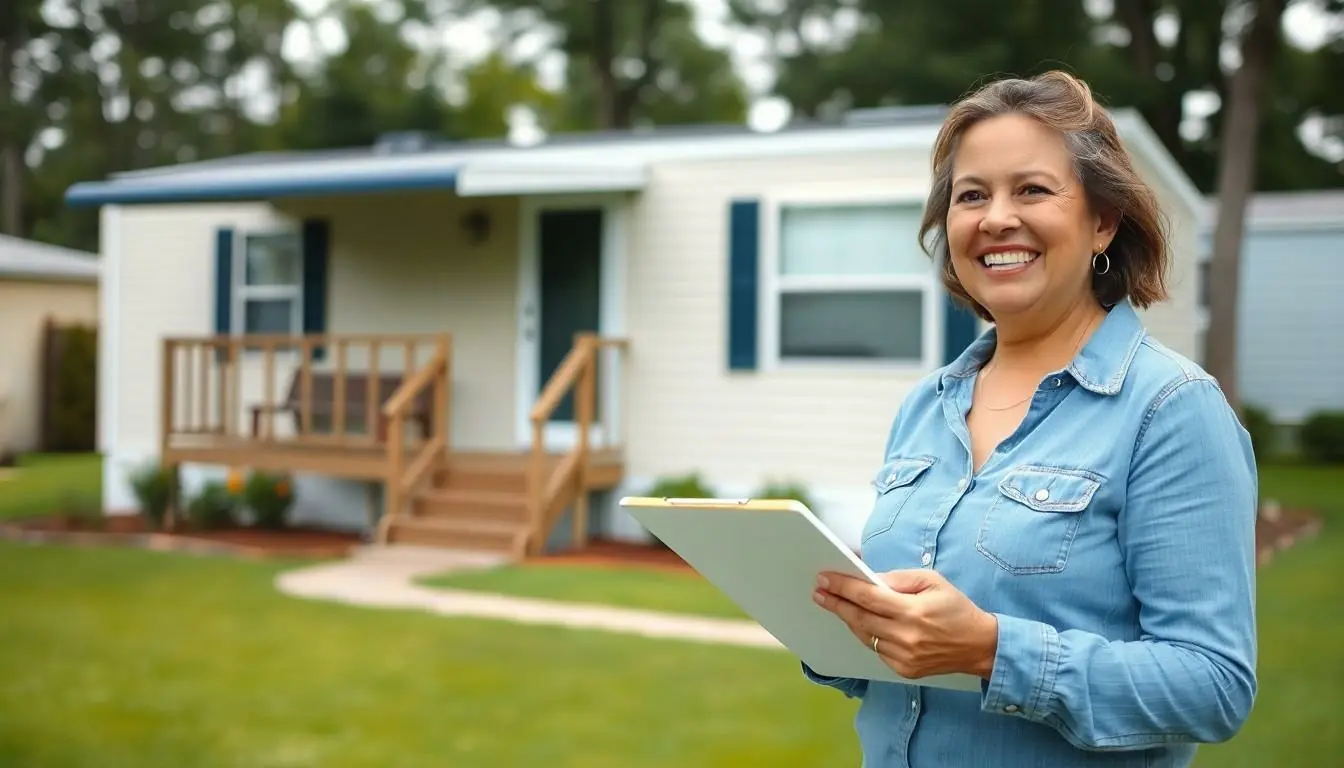Owning a mobile home can feel like living in a cozy, rolling paradise—until disaster strikes. Whether it’s a wayward tree branch or that neighbor’s cat with a penchant for mischief, protecting your mobile haven is crucial. Homeowners insurance for mobile homes isn’t just a safety net; it’s your trusty shield against the unexpected.
Table of Contents
ToggleOverview of Homeowners Insurance for a Mobile Home
Homeowners insurance provides essential protection for mobile home owners. Safeguarding against potential risks enhances peace of mind while living in a mobile environment.
Importance of Homeowners Insurance
Homeowners insurance plays a crucial role in risk management. It covers property damage caused by events like fire, theft, or severe weather. Financial protection from liabilities protects owners against legal claims from injuries on their property. Many lenders require insurance before approving financing for a mobile home. Adequate coverage ensures that replacements or repairs can take place without significant out-of-pocket expenses.
Differences Between Mobile Home and Traditional Home Insurance
Mobile home insurance differs significantly from traditional home insurance. Mobile homes often require specialized policies addressing unique risks. Coverage for mobile homes usually includes replacement cost for sections and personal property. Additionally, factors in location, age, and construction material influence premiums. Traditional home insurance typically covers more permanent structures with full replacement value. Individual needs may vary, making it essential to find a policy tailored to mobile home requirements.
Types of Coverage Options

Homeowners insurance for a mobile home includes several coverage options tailored to specific needs. Understanding these options helps ensure complete protection.
Liability Coverage
Liability coverage protects owners if someone gets injured on their property. This coverage also pays for damages to others’ property stemming from incidents related to the mobile home. Policies typically cover legal costs alongside settlement amounts. For instance, if a guest slips and falls, liability coverage handles medical bills and any lawsuits that might arise. It’s essential for mobile home owners to review maximum coverage amounts to align with their financial situation.
Property Coverage
Property coverage safeguards the mobile home and personal belongings against disasters. Common incidents like fire, theft, and severe weather may result in significant damage. Mobile home owners can choose actual cash value or replacement cost for their property. Actual cash value factors in depreciation, while replacement cost reimburses the current cost to replace items. This coverage includes both the structure of the mobile home and personal items inside it, ensuring valuable possessions are financially protected.
Additional Living Expenses
Additional living expenses coverage helps owners if the mobile home becomes uninhabitable due to a covered loss. This coverage pays for temporary housing costs, such as hotel bills or additional rent. Owners can rely on this financial support during repairs or rebuilding. It’s crucial for mobile home policies to specify coverage limits to avoid unexpected out-of-pocket expenses. Understanding these limits aids owners in managing their budget effectively while ensuring they maintain stable living conditions during repair periods.
Factors Affecting Premium Costs
Premium costs for homeowners insurance on mobile homes depend on various factors. Understanding these aspects helps owners find the best coverage.
Location of the Mobile Home
Location plays a significant role in determining premium costs. Areas with high rates of natural disasters, such as floods or hurricanes, often lead to higher premiums. Proximity to fire departments and hospitals also affects rates, as insurers consider access to emergency services. Urban locations typically present different risks compared to rural areas, influencing overall pricing. Homeowners in regions with a history of theft or vandalism might face higher premiums as well.
Age and Condition of the Home
Age and condition significantly impact insurance premiums. Older mobile homes may require more coverage due to outdated materials or systems, increasing the cost. Insurers assess the overall condition, including structural elements such as roofing and plumbing. A well-maintained home often attracts lower premiums, while signs of neglect could lead to hikes in costs. Regular inspections and upgrades can positively influence coverage options and costs.
Coverage Limits and Deductibles
Coverage limits and deductibles directly affect premium prices. Higher coverage limits generally result in increased premiums, as they offer more financial protection. Choosing lower deductibles can lead to higher monthly costs since the insurer assumes more risk. Conversely, opting for a higher deductible often results in lower premiums, but it increases out-of-pocket expenses in the event of a claim. Finding a balance between coverage limits and deductibles enables effective cost management for homeowners.
How to Choose the Right Policy
Selecting the right homeowners insurance for a mobile home involves careful consideration of several factors. Understanding the specifics ensures that the chosen policy adequately protects the living space.
Evaluating Insurance Providers
Research various insurance providers to determine their reputation and financial stability. Customer reviews provide insights into their claims process and customer service quality. Checking provider ratings from organizations like A.M. Best or J.D. Power enables informed decisions. Additionally, ensure that the selected provider specializes in mobile home insurance for tailored coverage options.
Understanding Policy Terms
Reading policy terms closely reveals coverage limits, exclusions, and conditions. Key aspects like replacement cost versus actual cash value dictate how claims are paid out. Familiarity with liability coverage specifics clarifies protections against injuries on the property. Assessing additional living expenses coverage also adds context for temporary housing in the event of a covered loss.
Comparing Quotes
Obtaining quotes from multiple insurers allows for effective cost comparison. Variations in premiums may occur based on coverage limits and deductibles. Collecting accurate information about the mobile home aids in receiving precise quotes. Evaluating the overall terms alongside prices leads to the best combination of coverage and affordability.
Common Exclusions and Limitations
Homeowners insurance for mobile homes often includes exclusions and limitations. Understanding these can help owners manage expectations and avoid unexpected financial burdens.
Natural Disasters
Natural disasters, including earthquakes and floods, often aren’t covered by standard homeowners insurance policies. Certain areas are more prone to specific threats, so homeowners may need additional coverage. Separate flood insurance is necessary for flood-related risks, while earthquake insurance typically requires a different policy enhancement. Owners should evaluate their location and make informed decisions regarding disaster coverage.
Wear and Tear
Wear and tear due to aging or poor maintenance is generally excluded from insurance policies. Regular maintenance and timely repairs help prolong the home’s lifespan. Insurance only covers sudden or accidental incidents, not gradual deterioration. Homeowners must invest in routine inspections and upkeep to prevent costly repairs that insurance won’t cover.
Unintentional Damages
Unintentional damages often receive limited coverage under standard homeowners insurance. Incidents like accidental spills or unintentional damage from pets typically don’t qualify for claims. Personal liability coverage offers protection against injuries to others and can help address certain accidental damages. Homeowners must familiarize themselves with specific exclusions to understand their policy’s limitations.
Homeowners insurance for mobile homes is an essential aspect of responsible ownership. It not only protects against unforeseen disasters but also ensures peace of mind for owners. By understanding the unique risks associated with mobile homes and the various coverage options available, owners can make informed decisions about their insurance needs.
Choosing the right policy involves evaluating factors like location, age, and specific coverage requirements. Awareness of common exclusions is crucial to avoid unexpected costs. With the right homeowners insurance, mobile home owners can safeguard their investment and navigate potential challenges with confidence.



